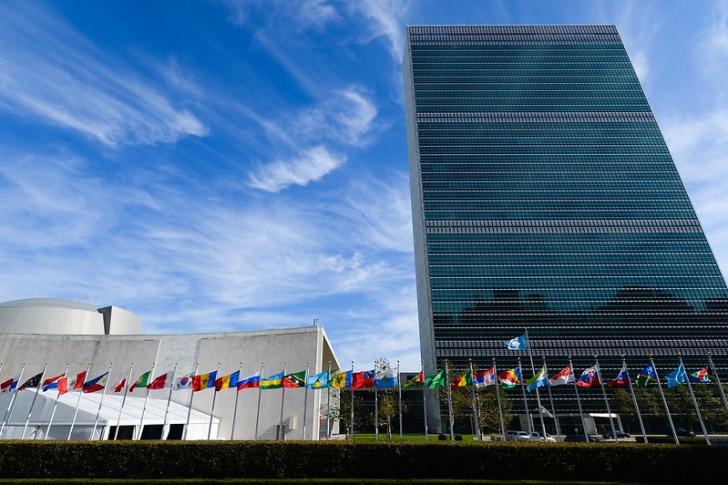
About the OEWG and this session
APC is currently participating in the fifth substantive session of the UN Open-ended Working Group on developments in the field of ICT in the context of international security (OEWG), taking place from 24 to 28 July 2023 at the UN headquarters in New York.
The OEWG, where all UN member states are invited to participate, is tasked with discussing responsible state behaviour in cyberspace, further development of rules, norms and principles, cyber threats, cooperative measures, cyber capacity building, and the application of international law to ICT use, among other issues.
APC recognises the OEWG as an important process to influence international norms on cybersecurity, as its outcomes can shape future cyber discussions at regional and national levels. Global cybersecurity discussions have significant impacts on regional and national policies and frameworks. While OEWG recommendations have the potential to enhance human rights and create a secure cyberspace, they could also be misused to exercise undue control over the internet, negatively affecting human rights and gender equality.
During this session, the group aims to adopt its second Annual Progress Report (APR), which will encompass all core topics of the OEWG's mandate and provide recommended next steps on each of them: Existing and Potential Threats, Rules, Norms and Principles, International Law, Confidence Building Measures, Capacity Building, and Regular Institutional Dialogue.
APC has joined with other civil society organisations to provide joint input on the revised zero draft of the APR. This input welcomes references to stakeholder engagement, including civil society, in a "systemic, sustained, and substantive manner." It also appreciates the prominence given to a gender perspective during discussions and emphasises the need to address differentiated impacts of cyber threats on vulnerable and marginalised groups.
In the joint input, together with partners, we recall that civil society plays a vital role in ensuring evidence-based, human-centric and rights-respecting approaches to cyber norm implementation. We also recall that civil society contributes to ensuring that cybersecurity laws, standards and policies align with international human rights law obligations. Furthermore, we stress the vital role that civil society plays in cyber capacity building, for example, by convening stakeholders and designing training that responds to local contexts; the African School on Internet Governance (AfriSIG), for instance, is a capacity-building initiative whose goal is to strengthen the capacities of African leaders to participate in local and international internet and cyber discussions. In the joint input, together with partners, we stress the importance of the principles from the 2021 OEWG report that emphasise the importance of gender-sensitive, inclusive, universal and non-discriminatory capacity building. Lastly, we recall that any future mechanism, like the cyber Programme of Action (PoA), should be open, inclusive, and transparent, with the active involvement of non-governmental stakeholders.
Our focus at this session
During this session, APC will continue to advocate for our priorities for the 2021-2025 OEWG. We will emphasise the need for a human rights-based approach to the work of the OEWG, placing people at the centre and ensuring trust and security in networks and devices that enhance human security.
We will encourage the group to recognise international human rights law as the guiding principle for a peaceful and stable cyberspace, ensuring the meaningful participation of multiple stakeholders in cyber discussions and empowering people for meaningful engagement. Additionally, we will continue calling for transparency in the implementation of norms, accountability for non-compliance with existing human rights norms and standards, and agreed norms for state behaviour in cyberspace.
APC will advocate for concrete measures through which states can realise these principles, such as committing to a more open, inclusive, diverse and participatory OEWG, for example, through an inclusive, action-oriented mechanism to help states achieve these goals.
A core focus of APC's participation will be promoting an intersectional gender perspective on international cybersecurity, as we have been doing since the group's first substantive session in 2019.
For APC, a gender approach to cybersecurity is a perspective that aims to address diverse and complex needs based on gender, sexual orientation, race, religion, ethnicity, ability, class and political affiliation, among other factors. It centres the human rights of people in the online context and aligns closely with other agendas like human rights and development. This approach encourages a re-evaluation of traditional cybersecurity concepts, moving away from a sole focus on technical aspects and national defence, to prioritise the diversity of people and communities. You can read more in our explainer on what a gender approach to cybersecurity entails. And you can find more guidance on how to integrate a gender perspective into cybersecurity, both at the national level and in multilateral cybersecurity forums and discussions, in our framework on this issue.
We will also highlight the importance of a gender-sensitive approach to cyber capacity that understands and considers the gendered impacts and implications of cyber threats. This approach calls for specific steps to address the needs, priorities, and capacities of women and people of diverse sexualities, gender expressions and identities. You can read more in our explainer on this topic.
Read more:
- APC framework for developing gender-responsive cybersecurity policy
- APC policy explainer: What is a gender approach to cybersecurity?
- APC policy explainer: What is a gender-sensitive approach to cyber capacity building?
More info on the OEWG, the draft programme for the Fifth Substantive Session, side events, and reference documents and statements can be accessed at the OEWG website. The meeting will be in person and will be streamed at UN WebTV. You also can follow the discussions on Twitter at #UNCyberOEWG.